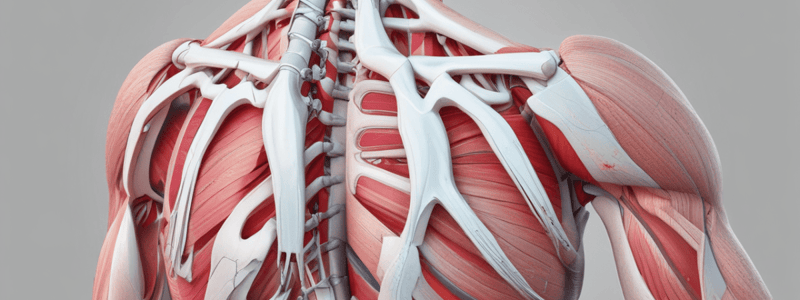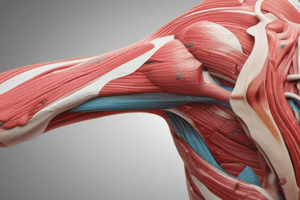Podcast
Questions and Answers
What anatomical structure partly surrounds the rotator cuff, predisposing it to injury?
What anatomical structure partly surrounds the rotator cuff, predisposing it to injury?
- Lesser tubercle of the humerus
- Glenoid labrum
- Head of the radius
- Greater tubercle of the humerus (correct)
Which movement dysfunction increases the risk of impingement of the rotator cuff?
Which movement dysfunction increases the risk of impingement of the rotator cuff?
- Superior gliding of the humeral head during abduction (correct)
- Inferior gliding of the humeral head during flexion
- Medial rotation of the humerus
- Lateral rotation of the humerus
What is a major vascular characteristic of the rotator cuff tendon?
What is a major vascular characteristic of the rotator cuff tendon?
- Moderately vascular
- Relatively avascular (correct)
- Non-vascular
- Highly vascular
Why might patients with rotator cuff issues find relief in a 'hands in your pocket' position?
Why might patients with rotator cuff issues find relief in a 'hands in your pocket' position?
What common activity further compromises the blood supply to the rotator cuff tendon?
What common activity further compromises the blood supply to the rotator cuff tendon?
What is a characteristic of the shoulder joint that contributes to rotator cuff injuries?
What is a characteristic of the shoulder joint that contributes to rotator cuff injuries?
Flashcards are hidden until you start studying
Study Notes
Rotator Cuff Injury Predisposition
- The rotator cuff is surrounded by the greater tubercle of the humerus, acromion, and coracoacromial ligament, making it prone to injury due to its location.
- The rotator cuff is susceptible to impingement due to any dysfunction in its ability to provide inferior gliding of the humeral head in the glenoid fossa during flexion and abduction.
- The rotator cuff tendon is relatively hypovascular, making it more vulnerable to injury.
Factors Compromising Blood Supply
- Repeated overhead reaching compromises the blood supply to the rotator cuff tendon.
- The normal weight of the arm hanging at the side also puts tension on the tendon, which can be relieved by the "hands in your pocket" position.
Muscular Stabilization and Impingement
- The shoulder joint is relatively unstable and relies on the muscular stabilization of the rotator cuff muscles.
- The rotator cuff muscles are subject to wear and tear due to their role in stabilizing the shoulder joint.
Clinical Implications
- Slings used in rotator cuff repair hold the shoulder in slight abduction to reduce tension on the tendon.
Studying That Suits You
Use AI to generate personalized quizzes and flashcards to suit your learning preferences.




